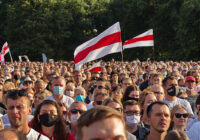In Moscow, all eyes are on Belarus. Russia and Belarus are intimately connected, so political actors in Russia feel an immediate connection with developments there.
In formal terms, the two countries form a “union state” and an economic and defense community. Belarus is Moscow’s closest ally and a linchpin for Russian neighborhood policy. For two decades, Russia has funded and subsidized Belarus’ state and economy. This has become a high price for a complicated relationship, as Belarusian President Alexander Lukashenko consistently — and successfully — spurns Russian attempts to deepen integration.
Belarus Election Unleashes Unprecedented Anti-Government Protests
Heading a joint state in Moscow had been raised as an option for keeping Russian President Vladimir Putin in power after 2024. Lukashenko was less than enthusiastic and turned, as always in moments of tension with Moscow, to the European Union. That variant is off the table, now that the amended Russian Constitution permits Putin two more terms in the Kremlin.
A Lack of Distance
Despite growing political differences, Moscow continues to support Lukashenko through his latest domestic political travails. Official figures put his share of the presidential vote at 80%. The candidate of the united opposition, Sviatlana Tsikhanouskaya, had just 10%, according to the Central Election Commission. Opposition exit polls paint a very different picture, with some showing the proportions exactly inverted.
Since the announcement of the results on August 9, the country has seen ongoing mass demonstrations, to which the security forces have responded with brutality. Nevertheless, President Putin congratulated Lukashenko on his “victory” as expected.
The Russian political discourse pays very close attention to developments in Belarus, reflecting a persistent post-imperial lack of distance to its sovereign neighbors. Looking at the Russian discussion, one might forget that there actually is a border between Russia and Belarus, much as was the case following the Ukrainian presidential election in 2019.
Another reason for this closeness lies in the similarity of the political systems. Both are aging autocracies that are out of touch with the societies they rule and suffer rapidly evaporating legitimacy. The economic crisis triggered by the COVID-19 pandemic is tangibly accelerating these processes in both states.
The Russian state media tend to play down the significance of the events and push a geopolitical interpretation in which the protesters are a minority controlled by hostile Western actors. They would not exist without Western support, it is asserted. The objective of Western policy is said to be reducing Russian influence in the region and, ultimately, “regime change” in Moscow. In other words, the issue is not liberty but geopolitical rivalry.
In this understanding, the trouble in Minsk is just the latest in a long series of Western plots against Russia — following the 2014 Euromaidan in Ukraine and the “color revolutions” of the early 2000s. The needs of Belarusian society are completely ignored.
Russia’s independent media, on the other hand, seek to present a realistic picture, concentrating on developments within Belarus and Lukashenko’s loss of public legitimacy. Belarus is also treated as a template for Russia’s own political future. Comparisons are frequently drawn with the ongoing protests in Khabarovsk, with speculation whether Minsk 2020 might be Moscow 2024.
Russian Intervention?
Foreign policy analysts in Moscow do not believe that Tsikhanouskaya can expect Western support. The European Union is divided, they note, weakened by COVID-19 and preoccupied with internal matters, while the United States is generally incapable of coherent foreign policy action. The regime will weather the storm, they believe, but emerge from it weakened.
This, in turn, will increase Lukashenko’s dependency on Moscow. Regime-loyal and more critical foreign policy experts alike concur that Russia will ultimately profit from the situation in Minsk without itself having to intervene politically or militarily.
The coming days will tell whether that assumption is correct. The regime in Minsk may have lost touch with the realities of Belarusian society, but it has good prospects of survival as long as the state apparatus backs Lukashenko and Russia maintains its support.
But if the unrest grows to paralyze the country, a Russian intervention cannot be excluded. The costs would be enormous, in view of the pandemic and the economic crisis. And an intervention could also harm the Kremlin domestically, where it has its own legitimacy problems. On the other hand, it would not be the first time Moscow chose geopolitics and great power bravado over economic and political reason. And Russia’s rulers are still happy to ride roughshod over society, both at home and in Belarus.
The EU cannot overlook the massive election fraud and the brutality of the security forces against unarmed demonstrators. It should back the demand for new elections, offer mediation and impose additional sanctions if the regime refuses to alter its current stance. But in the process, it should do everything it can to preserve contacts within Belarusian society. Clear communication with Moscow is vital, both to float possible solutions and to lay out the costs of intervention. There is no need to fear a quarrel — the EU has been in a conflict with Russia for a long time already.
*[This article was originally published by the German Institute for International and Security Affairs (SWP), which advises the German government and Bundestag on all questions relating to foreign and security policy.]
The views expressed in this article are the author’s own and do not necessarily reflect Fair Observer’s editorial policy.
Support Fair Observer
We rely on your support for our independence, diversity and quality.
For more than 10 years, Fair Observer has been free, fair and independent. No billionaire owns us, no advertisers control us. We are a reader-supported nonprofit. Unlike many other publications, we keep our content free for readers regardless of where they live or whether they can afford to pay. We have no paywalls and no ads.
In the post-truth era of fake news, echo chambers and filter bubbles, we publish a plurality of perspectives from around the world. Anyone can publish with us, but everyone goes through a rigorous editorial process. So, you get fact-checked, well-reasoned content instead of noise.
We publish 2,500+ voices from 90+ countries. We also conduct education and training programs
on subjects ranging from digital media and journalism to writing and critical thinking. This
doesn’t come cheap. Servers, editors, trainers and web developers cost
money.
Please consider supporting us on a regular basis as a recurring donor or a
sustaining member.
Will you support FO’s journalism?
We rely on your support for our independence, diversity and quality.






